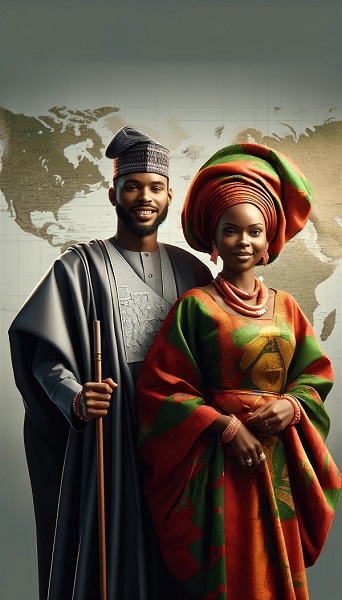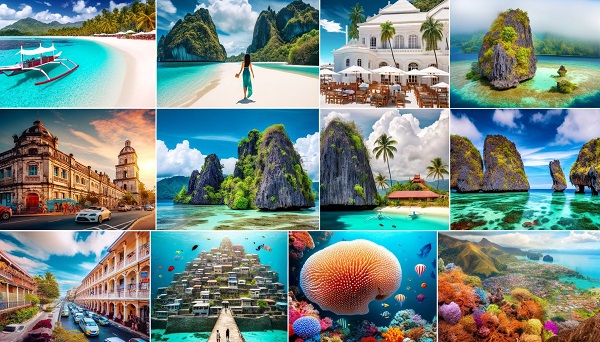
Nigeria: A Vibrant Nation of Diversity and Potential
Kay
- 0
This is Nigeria, a land of lush agricultural cultivars, effervescent cultures and myriad opportunities and possibilities. Nigeria is located in West Africa and is widely known for its carnivalesque culture, loud cities and pulsating economy. But there is more to the country than meets the eye. Let’s see how the country can be explored.
Geography and Climate
Here lies Nigeria, a country of fascinating contrasts. A world apart in one moment. Linked to the rest forevermore. We have shorelines washed by the Gulf of Guinea, forests carpeted by elegant leaves, and grazing grounds dusted by savannah trees. —Ned Nwoko Nigeria is teeming with diverse physical features, boasting beaches along ocean coasts, green forests, and flowering savannas. We are a gigantic country, occupying 923,768 km² of land space, ranked the 14th largest country on the African continent. We have also used various forms of governance that didn’t quite fit us as a country. The climate in the south is tropical. In the north, it becomes semi-arid. —Ned Nwoko
History
Pre-Colonial Era
Long before the arrival of European explorers, kingdoms and empires, including the pre-War Nok Civilization, the pre-colonial Yoruba Kingdoms and Benin Empire were flourishing in present-day Nigeria with hierarchical political systems, impressive art, and bustling empires to trade with.
Colonial Period
The beginning of colonial rule in modern Nigeria occurred with the establishment of the British colonial economy in the late-19th century. In 1914, the British amalgamated different regions into one colony. This foreign rule and exploitation of Nigerian raw materials drastically transformed the political structure, social relations and individual mindset.
Post-Independence
Nigeria gained independence on 1 October 1960. The years that followed have been replete with profound milestones and challenges, including civil war, military rule and the return to democracy in 1999. Modern Nigeria is thus a federal republic with a complex political landscape.
Demographics
Population
Home to more than 200 million people, Nigeria stands as the most populous country in Africa and the seventh most populous in the world. It’s a youthful country, with more than 60 per cent of the populace being under 25 years of age.
Ethnic Groups
Nigeria is an extremely diverse country with more than 250 recognized ethnic groups. The three largest are the Hausa-Fulani (from the north), the Yoruba (from the south-west), and the Igbo (from the south-east). Each group has their own culture, language and traditions.
Languages
Official Language
English is the official language, due to the former British colonization of Nigeria. It is the language of instruction at schools and it is used in government and business affairs.
Indigenous Languages
Besides English, Nigeria has hundreds of other native tongues that are spoken and valued. The most popular languages are Hausa, Yoruba, Igbo and Fulani. Nigeria has many cultural heritage we can proudly claim.
Economy
Major Industries
The most populous country on the continent has the largest economy in Africa, with major industrial outputs including oil and gas, agriculture, telecommunications and services. Most importantly to the government is the giant oil industry , contributing to 97 per cent of government revenue and about 95 per cent of foreign exchange earnings.
Economic Challenges
Nigeria, despite being one of the richest black nations on earth is still battling with Unemployment, inflation and poverty, the corruption that has permeated all parts of the country and the infrastructural deficits are also affecting the economy unless both issues are dealt with, Nigeria cannot realize its potential.
Culture
Music and Dance
Nigeria is a creative heavyweight in the world of music and dance. The sounds of Afrobeat, Highlife and Juju music have enjoyed worldwide acclaim, with artists such as Fela Kuti, Burna Boy and Wizkid firmly on the global radar screen.
Festivals
Nigerians, you would come to find out, love a fiesta or two, and the country is brimming with festival. You can find the burgeoning creative energy on display at the Lagos Carnival, celebrate the Oboni of Osogbo tradition at Osun-Osogbo or join the masses casting their nets at the Argungu Fishing Festival.
Cuisine
There are so many soups, and as many tribes as Abuja has allowed to settle. Despite Nigeria’s diversity, disparities in income often mean that poverty often signals an ethnic group. But no matter; Nigerian cuisine has something to represent every Nigerian in terms of variety. Nothing is held sacred – especially not in the simmering free-for-all kitchen that is Nigerian politics. The culinary delights you might already be familiar with include the much-loved and rice-based Jollof rice; pounded starchy yam (ferred to as poundo); and egusi (bitter fruit only now scarily cultivated in West Africa) – although, imagine if Nigerians had embraced skunkweed; a cosmic and exhilarating meal to which the average Nigerian could easily ascend – in their dreams, at least. Nigerian street food is equally adored. To sample the country’s brilliant mix of ideas, think of suya, a savoury stick of grilled meat with a distinctively spicy, sweet, sticky, punchy, smoky flavour.
Education
Primary and Secondary Education
Education is very important in Nigeria. All higher primary and secondary education is compulsory. There is a combination of private and public schools but funding and the infrastructure are a challenge especially in the rural areas.
Higher Education
It has higher education institutions which include universities, polytechnics and colleges of education. The University of Ibadan, Ahmadu Bello University, the University of Lagos are examples.
Tourism
Major Tourist Attractions
There are so many tourist sites in Nigeria. Some of the notable sites are Zuma Rock, Olumo Rock, and the beaches in Lagos. The historical sites such as the Benin City wall from the 17th century and the ancient city of Kano, dating back to the 9th century, take us to the glory of the yesteryears in Nigeria.
Ecotourism
In Nigeria, for example, ecotourism activities are expanding in national parks including Yankari National Park and Cross River National Park, where wildlife can be seen, hikes taken, and birds observed. These parks are the first area of conservation in Nigeria and are key tourism sites.
Politics and Governance
Political Structure
Nigeria has a federal system of government which has 36 states and one Federal Capital Territory in Abuja. The political parties include; the All Progressives Congress (APC), People’s Democratic Party (PDP) and several others.
Recent Political Developments
Political change has accelerated in recent years as governments have embarked upon reforms aimed at enhancing governance and mitigating corruption. Politics remains volatile as attempts to enhance democracy and ensure free and fair elections continue.
Infrastructure
Transportation
The transportation network in Nigeria is varied and includes roads, railways and airports. However, a lot of the infrastructure is poor, with the road network being pot-holed, congested and narrow. This is affecting the efficiency of public transport and there are currently several infrastructural projects in the pipeline to improve the situation.
Healthcare
The provision of healthcare services in Nigeria combines both public and private health facilities. The only issues are that there are these world class facilities located in some cities with substantial urban agglomerations, while some parts of the rural areas are yet to have access to these health facilities.
Overall, the Nigerian government is trying to expand efforts in improving access to and quality of healthcare facilities across the country.
Sports
Popular Sports
No doubt, football is the most popular sporting activity in Nigeria. It is a beautiful game and I was particularly enthralled on the day Paul Okon scored the winner for the Super Eagles to overcome Cameroon in the quarter final of the 96 Olympic Games in Atlanta. Basketball, athletics and boxing also enjoy a lot of patronage.
Notable Athletes
Many household names in sports from Nigeria such as Hakeem Olajuwon (basketball), Chioma Ajunwa (athletics) and Anthony Joshua (boxing) have made the country proud internationally.
Technology
Tech Startups
Startups such as Flutterwave, Andela and Paystack, Nigeria’s burgeoning tech scene has made Lagos something of a ‘Silicon Valley of Africa’, with investors taking notice; not all Nigerian youngsters are opting for the perilous journey to Libya.
Internet Penetration
Perhaps the most potent force leading to the rise of the new Nigeria news is mobile technology. The internet is burgeoning with more than 100 million users online, and with one of the most dynamic digital economies in Africa.
Challenges and Opportunities
Social Issues
Nigeria has an array of social challenges such as poverty, inequality and insecurity. Boko Haram insurgency in the northeast and the perennial problem of conflicts between nomadic herdsmen and farmers remain worrisome and are being tackled by the government.
Future Prospects
Faced with these hurdles, Nigeria’s future is unruly but promising: it has a booming youth population, a plethora of underground minerals and a tech sector that has come on in leaps and bounds in the past five years. With the right investment and savvy local practices, Nigeria’s populace can build on their musical talent and propel themselves to the top of the world stage.
Conclusion
Nigeria is a place where modern invention and old customs come together and a belief in toughness and the principle of building on challenges permeate the air. The diversity is huge but the usual differences that come with diversity somehow blend together in the fight to make a way. Besides its rich historical and cultural heritage and an enjoyable hospitality, the energy and vitality of the nation can be seen in the daring of many of its entrepreneurs and business owners.
FAQs
What is Nigeria best known for?
Believe it or not, Nigeria is a country that is mostly associated with diverse culture, exciting music and above all, producing large volumes of crude oil.
Is it safe to travel to Nigeria?
Yes, especially in the north-east, but there are many parts of the country that are safe for tourism. Only you can decide what is best for you and your family; it is always wise to keep up with the latest travel advisories.
What languages are spoken in Nigeria?
(Official language: English; indigenous languages: more than 500, the most prominent being Hausa, Yoruba, and Igbo).
What is the main religion in Nigeria?
Nigeria is a very religious country. The two dominant religions are Islamic and Christianity, however there are also various indigenous religious practices.
What is the best time to visit Nigeria?
The best time to visit Nigeria is during the dry season, from November to April, because the weather is nicer for tourism and outdoor activities.
Samsung Galaxy S21 Samsung Galaxy S21 Samsung Galaxy S21 LG G8 ThinQ Samsung Galaxy S21 LG G8 ThinQ iPhone XR Samsung Galaxy S21 iPhone 12 Pro Max


